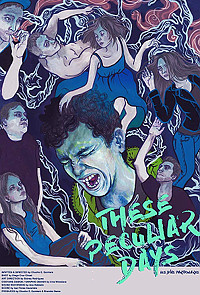| SHADOWS ON THE WALL | REVIEWS | NEWS | FESTIVAL | AWARDS | Q&A | ABOUT | TALKBACK | |||||||||||||
 Shadows off the beaten path Shadows off the beaten pathIndies, foreigns, docs, revivals and shorts...
On this page:
INVISIBLE LIFE |
PERMISSION |
THESE PECULIAR DAYS
| |||||||||||||
| See also: SHADOWS FILM FESTIVAL | Last update 23.Oct.19 | |||||||||||||
|
Invisible Life A Vida Invisível de Eurídice Gusmão Review by Rich Cline |  MUST
MUST  SEE SEE
| |||||||||||||
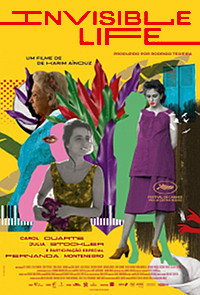 dir Karim Ainouz scr Ines Bortagaray, Karim Ainouz prd Rodrigo Teixeira, Michael Weber, Viola Fugen with Carol Duarte, Julia Stockler, Barbara Santos, Fernanda Montenegro, Antonio Fonseca, Flavia Gusmao, Gregorio Duvivier, Maria Manoella, Flavio Bauraqui, Cristina Pereira, Gillray Coutinho, Nikolas Antunes release US Sep.19 aff, UK Oct.19 lff, Br 31.Oct.19 19/Brazil Sony 2h19 CANNES FILM FEST TORONTO FILM FEST  |
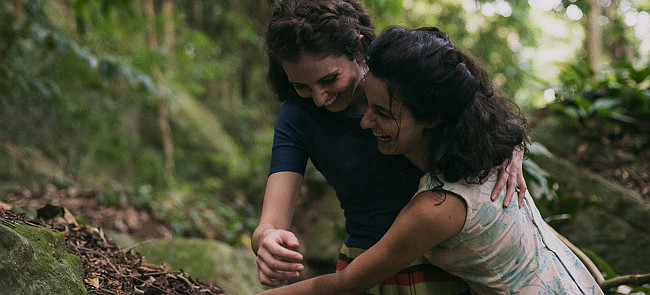 Gorgeously filmed in rich, deep colours and infused with even stronger emotions, this Brazilian drama tells the epic story of a family spanning nearly 70 years. This is a beautiful depiction of the lingering connections between siblings, parents, children and lifelong friends. And it's also a reminder that the expectations and assumptions we make about the people we love probably aren't very accurate or helpful. In 1950 Rio, 18-year-old Euridice (Duarte) and her sister Guida (Stockler) are inseparable. Euridice dreams of studying piano in Vienna, but is set to marry Antenor (Duvivier) instead. And Guida elopes with a swarthy Greek sailor (Antunes). When Guida returns pregnant and alone, her parents (Fonseca and Gusmao) reject her. They also let her believe that Euridice is in Vienna. So the two sisters live their lives in the same city without knowing it. Guida and her son live with the free-living Filomena (Santos), while Euridice has a daughter and struggles against Antenor's machismo. These women live lives they never planned, imagining a completely different life for their sister, and scenes cleverly echo and mirror each other. Filmmaker Ainouz beautifully captures the setting, where the jungle meets the sea and the modern city meets the slum. There are striking patterns and textures everywhere, breathing life into the characters and their situations without ever tipping into melodrama. And both women are strong and intelligent, shaped by their experiences. In their diverging stories, Duarte and Stockler are terrific. Euridice can only rebel within the confines of society, while Guida has been cut loose to live on her terms and to prevent her son from turning into her sexist father. So Duvivier and Fonseca are superb in difficult roles, villainous simply because they don't know any other way. And Gusmao shines as a woman who has to conceal her affection for her daughters. And then there's the incandescent Montenegro, who plays the older Euridice with grace and profound resonance. The film has extraordinary vitality, filled with laughter and music, complex interaction and realistic sexuality. There are several stunning sequences, including one beautifully orchestrated near-miss meeting. And the sisters' yearning for each other, combined with their hopeful imaginations, is powerfully involving. So in the final coda, when the story catches up to the present day, it carries a powerfully emotional kick. And it reminds us that life is about the journey, not the destination.
| ||||||||||||
|
Permission aka Cold Sweat Review by Rich Cline | 
| |||||||||||||
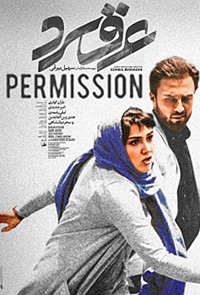 dir-scr Soheil Beiraghi prd Soheil Beiraghi, Mahdi Davari with Baran Kosari, Amir Jadidi, Sahar Dolatshahi, Leili Rashidi, Hoda Zeinolabedin, Abbas Moosavi, Maryam Sarmadi, Sogand Soleymani release Irn 26.Sep.18, US Jan.19 psiff, UK 22.Nov.19 18/Iran 1h28 |
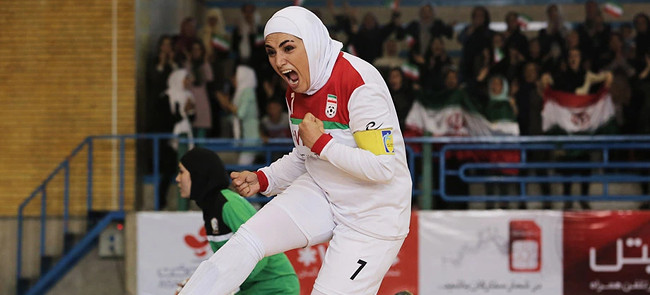 With its energetic pace and bracingly matter-of-fact tone, this Iranian drama takes an unflinching look at a legal situation that seems utterly unworkable. Loosely based on a true story, the central theme is the injustice between genders in Iranian society, in which women are completely helpless under the law. Filmmaker Soheil Beiraghi tells this story with urgency and compassion, and the actors create characters who are powerfully authentic. The star captain of Iran's futsal (indoor football) team, Afrooz (Kosari) can't board the flight to the world championships because her husband Yaser (Jadidi) has withdrawn permission. When the football federation refuses to help, and team supervisor (Dolatshahi) shows no sympathy for her plight, Afrooz appeals to the aggressive, abusive Yaser, a TV presenter with a carefully cultivated nice-guy persona. But he plays control games with her. So she turns to social media for support, enlisting an human rights lawyer (Rashidi). But even when Yasser blatantly betrays her, he has the law on his side. Right from the start, Beiraghi's camerawork puts the audience into the story, using close-up handheld cinematography that isolates Afrooz on the football pitch, in cars and offices. She's alone even when she's in a crowd of people, swimming upstream against a current of laws and traditions. Her face shifts between the raw joy of her futsal triumphs to churning annoyance at the system she's forced to endure. So each setback feels painfully unfair. Kosari delivers a fiery performance as a smart, gifted young woman unable to convince anyone around her to listen to what she says. Erupting with righteous indignation, her reactions don't help her cause, but it's impossible to imagine her simply accepting the injustice as expected. By contrast, Jadidi skilfully gives Yaser the confidence of authority, even though he knows what he's doing is heartlessly cruel. It's clear that even he doesn't believe the ridiculous lies he tells to officials, and yet he gets away with all of it. This story may be set in country with a religious-based legal system, but it's also strikingly easy to identify with. These people are earthy and recognisable, dashing around a modern city, answering (or ignoring) text messages as they just try to get on with their lives, while inequity in the system is making things impossible. As a simple illustration of where the power lies, Beiraghi depicts Afrooz playing football with the boys on a warm evening: the men are in T-shirts and shorts, while she's wearing a headscarf, long sleeves and long sweats.
| ||||||||||||
|
These Peculiar Days Los Días Particulares Review by Rich Cline | 

| 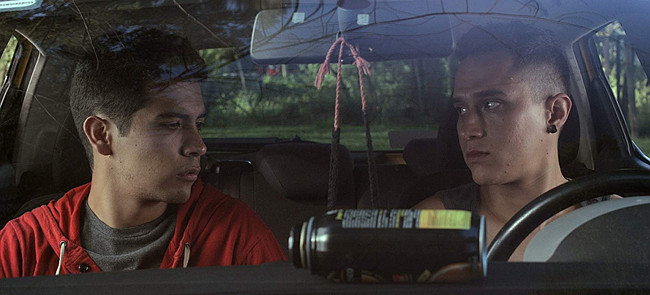 There's an edgy, loose honesty to this film that disarms the audience right from the start. Using improvisational-style dialog, complex characters and careful editing choices, filmmaker Chucho Quintero quickly cuts beneath the comical surface to find some dark thoughtfulness underneath, although it takes the audience a little while to figure out who these people are and how they are interconnected. And even then, their links are very messy. As their graduation approaches, eight teen friends gather for a weekend at a cabin in the woods. There's tension in the air because Roman (Del Razo) has seriously hurt Isabel (Sylwin) by having a fling with Oscar (Huber), who's also here. But then, now Isabel has rebounded with Renata (Lecuona). In between the dead-quiet of mealtimes, they pair off and chat about their feelings, suspicions and fantasies, rifling through their past and pondering the future. There's also the problem that their friend Juan Pablo (Navarette) has gone missing. Flickering flashbacks reveal a range of connections between these young people, including a rather blinding array of past sexual encounters and relational complications. The sexual fluidity of these teens is strikingly offhanded, with sex scenes spliced together to show that gender means very little for these young people. Their bodies crave each other, but they are beginning to understand that their feelings run much deeper. Even the group's alpha male clown Roco (Aguilasocho) is beginning to look inside himself. The youthful cast members continually find underlying yearnings in scenes that range from light comedy to dark drama, by way of sometimes fantasy-style flashbacks and an extended drug trip. It's not easy to keep the characters straight, especially in the cutaways, so the various couplings (and triplings) add more texture than meaning. At the centre of the ensemble, Del Razo and Sylwin are the most memorable, with their thoughtful, almost haunted performances. And Huber has some strong moments too. Quintero builds a remarkable atmosphere as the weekend progresses, piling a range of emotions on top of each other. Some events are momentous, and others feel rather contrived. By Monday, it seems like everyone has surely slept with everyone else, like a scrambled Midsummer Night's Teenage Dream. So in the end, it feels both prickly and warm at the same time, thankfully avoiding a neat, tidy conclusion or a big lesson that needs to be learned. Instead, where it goes rings true to the film's youthful energy.
| 
See also: SHADOWS FILM FESTIVAL © 2019 by Rich Cline, Shadows
on the Wall
HOME | REVIEWS | NEWS | FESTIVAL | AWARDS
| Q&A | ABOUT | TALKBACK | | ||||||||||


